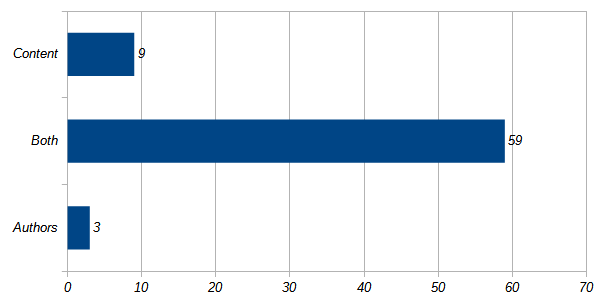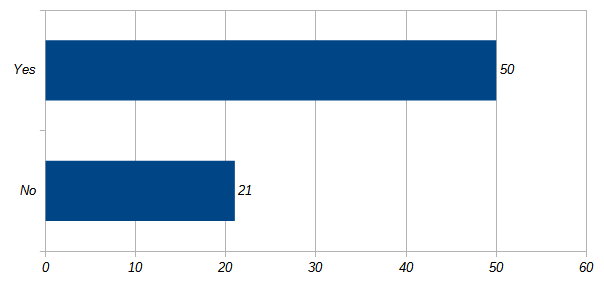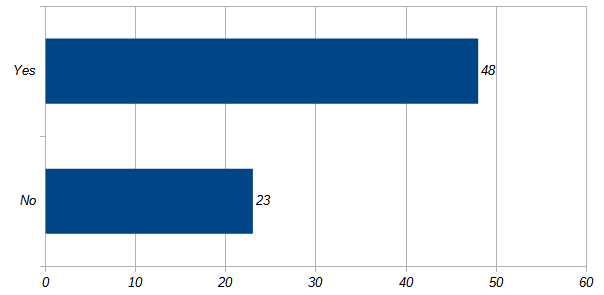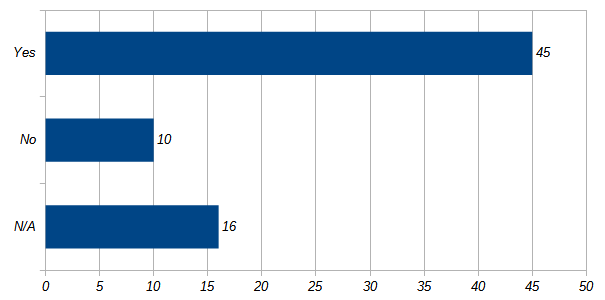Image credit: The Power of Unconventional Thinking, David McWilliams
Topical authority has become a very popular topic in the world of SEO, but it seems there isn’t a common meaning to everyone using the phrase.
Since it seems to mean different things to different people, I became curious how this vaguely defined term, that has become important to SEO success, is thought about.
What do people think it means.
For that reason, I created a survey.
Jump ahead to:
Methodology
I created the survey using SurveyPlanet. I searched on LinkedIn to find profiles that match for “topical authority”. I sent a short LinkedIn invitation explaining I was doing research for an article and asked if they would please take my survey.
71 people did.
The selection
Some self selection was involved as while I searched for LinkedIn profiles that matched for “topical authority” I sent far more invitations out than 71. So the people who took the survey self selected to do so presumably because the question also interested them.
The questions
There were four questions where I asked for answers that could be charted and those charts are below.
The other questions were open ended where the person provided a response in their own words. For those questions I provided the responses below that I thought were the most interesting.
Willing to leave their email address?
I didn’t want the requirement of submitting an email address to prevent anyone from taking my survey, so I made it optional.
While I expected everyone to leave their email address (what is your email address being one of the questions) I was surprised when 12 of the 71 did not. I’m not sure if or how this is or is not relevant to the quality of their answers.
We're building a White Hat Link Exchange - for real - click here to learn moreThe four questions I can chart
Does “topical authority” apply to content, authors, or both?
That “both” is the clear favorite did not surprise me. But that 17% of survey takers disagreed did.

Do you think EEAT is related to what was once called Google Authorship?
I didn’t have an expectation for this answer as since Google Authorship was abandoned some years ago it has become somewhat out of sight and out of mind.
But as someone who believes the answer is “yes” it did feel validating that so many agreed.

Do you have a portfolio of work you share with others?
This answer did surprise me. I expected a much higher percentage of survey takers to answer “yes”.

Are you working to increase your topical authority over time?
But maybe that 36% of survey takers answered this question with “no” or “N/A” answers why 32% of survey takers do not keep a portfolio of work to show to others.
If you’re not working to grow your topical authority over time, then maybe keeping a portfolio is excess overhead and not worth the effort.

The free form questions I can not chart
I have to open to the idea that my biases are reflected below, as since I’m selecting the answers I feel are most interesting, they’re
By virtue of me selecting which answers are interesting, my biases are the filter though which they pass. So bear that in mind.
Of course, this causes me to wonder whether the answers below provide true value, confirm preconceived notions of mine, or maybe a little bit of both.
I guess it’s up to you to judge that.
What does the phrase “Topical Authority” mean to you?
Everybody gave some form what I’ll call “the standard” answer of expertise, authority, trustworthiness, etc.
Some said it’s a way of outranking others. Some just said stuff like “establishing E-E-A-T” which reminded me of a scene in a movie where the MIT professor asks the students in his non-linear algebra class what they think the class is about and one student says “non-linear algebra”. While the answer wasn’t wrong, it provided no insight.
Interestingly (at least to me) three answers stood out and they started with some variant of “to me” and then said things that resonated, to me. Maybe their use of those two words influenced my selection.
I think the reason these answers work for me is that they all embody the idea of “trust”.
“To me, Topical Authority stands for authentic, original and relevant content. Every company tries to be the topical authority in their own field through continuous content generation that is meaningful and helpful to its audience. It ultimately boils down to trust, I feel. To what extent a reader trusts a particular website/company/app as their primary source of information on a topic matter. And this crucial element of trust needs to built over time with in-depth topical research.”.
“Topical Authority, for me, is more than just being an expert on a particular subject and/or trying to rank a website on that subject. It’s about being a credible source, a go-to place; something that both Google and human alike found you as the most relevant and reliable information. So it isn’t just about covering every single keyword there is for that subject, but going beyond it – doing the necessary experiments, or research, or surveys – to get more data or facts.”.
“To me, “Topical Authority” embodies expertise and credibility within a specific subject area. It’s about being recognised as a trusted source of information or opinion in a particular field. Achieving topical authority requires not only deep knowledge but also consistent engagement, contribution, and staying up-to-date with the latest developments. It’s like being the go-to person for insights, analysis, and guidance within your niche, earning the respect of peers and followers alike.”.
We're building a White Hat Link Exchange - for real - click here to learn moreIf you are [working to increase your topical authority], how are you working to increase your topical authority over time?
Some survey takers were experts. A lawyer writing about legal issues for example.
But for others, the key concept was “research” which makes sense.
One respondent gave an incredibly concise answer that provided the core ideas of almost every answer.
“By writing more, researching even more, and creating informational articles and posts.”.
Not all answers were that concise, but they generally conveyed the same idea. For example…
“Having been a freelance writer since 2005, serving local business marketing agencies’ clients, I’ve had the opportunity to interview, research, and partner with experts in a variety of fields. My goal is to understand their business, their customers, their customers’ needs, and their offers so I can present even complicated ideas to everyday people.”.
How do you learn about your particular topic/niche?
These answers fell into two broad categories depending if the person wrote about their area of expertise or were writing for clients who had the expertise.
- They are an expert (practicing lawyer for 20 years , 20 year career as a nuclear engineer, etc).
- Research and continuous learning.
My personal favorite answer was:
“Research. Research. Research. And practical experience i.e. the hands-on stuff. If you only research without applying your knowledge in the field, then you’re just an academic.”.
How do you stay current?
Every answer was some variant of “reading, lectures, experiments” with an emphasis on keeping and following lists of experts who seem to know what they’re talking about.
The common thread here is “continuous learning”.
We're building a White Hat Link Exchange - for real - click here to learn moreHow often do you engage with peers who have the same topic of authority niche?
There was no pattern or common anything here, at all. Answers varied from “rarely” to “daily” and it depended entirely on circumstances. This question turned out to be meaningless, as judging from the diversity of responses, the only “correct” answer seems to be the answer SEO people sometimes joke about, which is “it depends”.
Do you think social media influencers are important in your journey to become a topical authority?
Again, “it depends”. Some answered a terse “no”, others spoke of following social media accounts of topic experts.
How do you evaluate whether or not a website is achieving topical authority?
Answers to this question fell into two broad categories:
- People tell me it’s good.
- It ranks well on Google.
Which makes sense. I’m not sure what I was expecting here.
Conclusions
Where authority comes from
My main conclusion is that there is a general acceptance that authority “flows” to websites and brands through authors.
The most important attribute of authority
Seems to be “trust”. Which upon reflection, makes sense in a era of pretty extreme misinformation.
We're building a White Hat Link Exchange - for real - click here to learn moreAcknowledgments
I told people that if this article got published on a site that would allow me to provide them an acknowledgement link that I would do so. Since it’s published on our site, I can, so here is a partial list of survey respondents.
The list is partial because not everyone wanted an acknowledgement link.
- Kenneth Faveron of Digital Elevator
- Shannon Hayner, author, speaker, and guide for creative professionals
- Anonymous of Enhancv
- Vladimir Ceric of Marketing4Tech
- Anonymous at Trail Digital
- Miles Anthony Smith of AmaLinksPro
- Anonymous of Booqable
- Saeed Ali of Evstore
- Tanja Kropf of AdultsPlaySports
- James Soohoo of NFL Cheapskates (that’s a great name!)
- Ben Poulton of Intellar
- Madhumitha Viswanath of Walmart Global Tech India
- David Peniel of Copywriter
- Andrei Turca – SEO Specialist
- Lee Densmer of Globia Content Marketing
- Maja Djolovic of Veeve Systems
- Sue LaPointe of Triumph Communications
- Jerry Doby of Doby Communications
- Jesse Teske of JCT Growth
- Jonathan Lister of DEPT
- Jonathan Mast of White Beard Strategies
- Tanaaz Khan – Freelance content strategist and writer
- Jeff Coyle of MarketMuse
- Abiye Lawson of Vennroad
- Daniel Muraga – Freelance content strategist
- V. Michael Santoro of Brand Velocity
- Jannatun Nayeem of Sales Pilot Agency
- Arnab Chakraborty of Diginamic IT Services
- Jeff Cherrington of Rocket Software
- Jerin John of 3C Brand Hub
- Kim Van Deventer of Health Content
- Poorti Gupta of SaaSMention
- Shana Aguilar of Omniscient
- Brian Kaguiri of OffloadHQ
- Sandra Nomoto of Sandra Nomoto Enterprises
- John Gasior of Game Lounge
- Ewelina Aiossa of Topical Skin
- Damir Bilalov – Freelance SEO Expert
- Andrew Barrett of Barrett Strategic Consulting
- Anthony B. Scott of Barclay Street Real Estate
- Jessyca Frederick of SEObyJessyca
- Mania Mashhadi of Rizq
- Matt Hepburn of The Focus Visibility Podcast
- Vladimir Minovski of CommandingWeb
- Erin Porter of Red Shark Digital
- Kristin Holtshouser of Carrot Top Industries
- Alex Tuck of CIWEM
- Anonymous at Black Star Fund
- Adam Bogar at Textor Languages
- Tylor Webb at IKM Testing UK
- Priyank Soni of RankRight
- Junie Rutkevich – Content Influence Strategist
- Samuel Karugu of The Avalon Writer
- Latha Lukose of Indian Mom Blogs

1 Response to "Topical Authority: What does this mean?"
Thanks for mentioning me in the list! Great article Kevin.